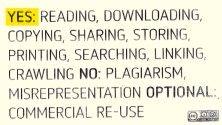We spoke recently with Paolo Mangiafico, the Director of Digital Information Strategy in the Office of the Provost at Duke University, about Duke's open access initiatives.
Recently, Duke announced that it would join MIT, Harvard and Stanford in adopting an open access policy, in which the scholarly articles written by faculty members are made freely available to the public for non-commercial use, by default. What was the rationale for Duke's decision?
Duke's strategic plan says that one of our key goals is to apply knowledge in the service of society. Currently, much of the knowledge produced by Duke faculty is published in venues with limited distribution and often very high subscription rates that preclude access by many who would benefit from reading it. Making the research freely available to anyone with Internet access helps to increase the potential number of readers, and opens up possibilities for more people to make use of and build on the research being done here.
We also expect to see benefits for the researchers themselves and the institution. Every author wants to be read, and hopes their work will be widely read and cited, and will be influential. Logically it makes sense, and there are a growing number of studies that indicate this, that research that is more broadly available is read more often and cited more often. So more openness helps increase the reach and impact of Duke scholarship, which not only helps contribute to the scholarly community and society overall, but also helps raise the profile of Duke scholars and Duke University.
There's also a trend among granting agencies and some of our peer institutions toward more open access to research, and befitting Duke's role as a leading research university, we want to be at the forefront of this trend. The NIH already requires research they fund to be made available via open access (after an embargo period) and there's a bill in congress right now called FRPAA (Federal Research Public Access Act) that, if passed, will make open access (again, after a brief embargo period) a requirement for research funded by all the big federal federal agencies. We will have to develop mechanisms to comply with these requirements, and a Duke-wide policy will help us to do this in a more consistent way across all Duke research, not just the portion that is funded through federal agencies.
Finally, having the full text of thousands of articles authored by Duke researchers in a local archive also gives us a richer basis to build an online collaboration network among scholars at Duke. We're in the process of developing a system that will collect a variety of information about the research and teaching activities of Duke scholars, both to include in profile pages about them, but also to help them find each other by shared interests and to support the development of more interdisciplinary collaboration on campus. By collecting a more complete set of full text for Duke faculty publications and combining it with other data, we'll be able to look for patterns in citations or topics or keywords and use these to build recommender systems that help connect researchers at Duke with each other and with their colleagues elsewhere. We're planning to use the publications not just for reading, in other words, but also as a data set to map human networks.
MIT uses an instance of dspace to make their articles available. How will Duke make their work available, and when will we begin to see these articles?
Duke has had a DSpace instance running for several years, called DukeSpace, and so far it has mostly been used for electronic theses and dissertations. In the short term we'll be using DukeSpace as the platform for archiving and access of faculty publications too, though over the longer term we're likely to move toward a new repository system being developed at Duke using the Fedora Commons platform. It's currently in development by a team at Duke Libraries, and has recently been opensourced at tridentproject.org. Trident is currently being developed with the library's digital collections in mind, but it's designed to allow for different media types, content models, workflows, and descriptive metadata schemas to be implemented too.
But perhaps more important than the software right now is a service model, which is also in development by Duke Libraries. Having a repository and default policy that faculty should deposit their articles is not enough -- we know we need to provide services that will help make it easy for articles to be collected for archiving and open access, so that we can do this without imposing additional administrative tasks on faculty, who are already busy and want to spend as much time as possible on their research and teaching. We're planning a service model where librarians, through both manual and automated processes, will periodically compile lists of all the publications by Duke authors in the areas they serve, and then work with the authors to confirm the details and get copies of the articles, give them the opportunity to opt out of open access, and help with the metadata and deposit of the papers. We expect this service model to be piloted by the fall and refined over the next academic year.
Will you have an opt-out policy for those faculty members who would rather not make their work freely available, for whatever reason, and if so, do you anticipate that many Duke faculty will opt out in this way?
Yes, the policy does include an opt out provision, and it was important that we included that because there may be cases where providing open access from Duke might cause problems with an author's publisher, or where the author may have other reasons why they don't want their work provided via open access, and we need to respect that.
One of the goals in this project is to return control over an author's work to the author themselves -- right now, typically authors sign over all rights to a publisher, and then have no rights in their own works, and even have to buy back copies of something they themselves have written if they want to share it with others. This policy will retain some rights for the Duke and for the author, and give both Duke and the author some options they typically don't have now. Among those options is the freedom to still sign over all rights to someone else if you choose to do so, or if you need to do so to ensure that your work is published in the journals where you want to be published.
It's important to protect individual choice, but at the same time to inform those choices so authors can make decisions that may be more beneficial to themselves and to the broader community than what they might do otherwise. We've set the default to openness, and will try to make it easy for Duke authors to be more open, but don't want to force anybody's hand if they think it's not in their interests. We think that if our service model works well, we'll have good participation - most of the faculty we talked to while developing this policy were eager to make their work more openly available, and just wanted it to be easier to do so. We anticipate that as this develops, even those who may have concerns in the short term will see the benefits and choose to participate rather than opting out.
Modern American scholarship currently demands that aspiring professors be published in scholarly journals in order to be considered for tenure. Basically, the aspirant must give away his or her own intellectual property, for free, to commercial journals that make a hefty return, with only very limited rights returned, in order even to have a chance at a career in scholarship. Do professors have any recourse to preserve their own IP rights, if they want a shot at tenure?
Policies like the one we've just adopted at Duke should help with retaining intellectual property rights. We'll be helping authors to understand that they don't necessarily need to give up their rights in order to get published in the venues they want to get published in, and the university will help them to retain their rights and support them in negotiations with publishers, if necessary. We're trying to move toward a mode where getting published in a quality journal and keeping rights to share your own work as you wish are not mutually exclusive. Right now rights transfer is often tightly bundled to the editorial and dissemination processes, but there's no overriding reason why that needs to continue to be so.
Duke University Press Online currently offers paid subscriptions to 36 scholarly journals. Does Duke have concerns that making articles freely available might risk publishing revenues over the long term, and if so, what are Duke's plans to mitigate that risk?
I think every publisher has concerns, largely because it's unclear yet how the transformation in scholarly publishing and scholarly communication will play itself out. This is an area that's undergoing disruptive forces from a number of directions, and the trend toward more open access is just one of them. Having said that, Duke Press and many other publishers do already allow open access self-archiving by their authors in personal or institutional repositories. In some cases they require 6 or 12 month embargoes before open access, to protect the commercial value of immediate access after publication, and the new Duke policy is fully supportive of that. Someone from Duke Press was on the Task Force that developed the Duke open access policy, and their concerns were always in our minds throughout the process. We have to recognize that scholarly presses are an important node in the scholarly communications ecosystem, and while we want to move toward a model of sharing scholarship that's more in line with the goals and values of the university, we have to be careful not to throw out the baby with the bathwater. What we're doing right now is not intended to replace existing scholarly publishing processes, but to supplement them.
In the last twenty years, the subscription costs of scholarly journals have gone up dramatically. Hal Abelson of MIT points out that while MIT's spending on books has gone up around 30%, commensurate with the consumer price index over the same time, MIT's expenditures for scholarly journals have risen by over 350%. Has the quality of scholarly journals radically increased, or has only the price increased -- and why?
It's difficult to see the justification for that level of increase in costs, but whatever the reason, it's clearly unsustainable. It is true that journal publishers are providing a number of services now that they weren't providing before, and those services do have real costs associated with them. But research libraries, who are the main purchasers of these subscriptions, don't have budgets that are increasing anywhere near the same rate as the costs are increasing, and as a result have to cancel subscriptions or reduce their spending in other areas, resulting in a net decrease in access to the communities they serve, and not incidentally, decreasing revenue sources for smaller scholarly publishers. Something has to give. This is an area ripe for innovation, though as with any area that's ready for disruptive innovations, there are lots of variables and risks, and we can't easily foresee how it will play out.
One of the trends that I think we'll see a lot more exploration in is trying to figure out how to unbundle many of the services publishers provide, and how to be compensated for added value services rather than through limiting access to information as a product. Scholarly publishing has traditionally performed a number of roles: filtration (selection of the best ideas or most important discoveries for broad sharing); validation (peer review confirming the validity of the ideas or discoveries); registration (a venue for publicly claiming credit for an idea or discovery); dissemination (making a record of the ideas or discovery broadly available); designation (providing indicators of the value of an individual's work that is often used in promotion and tenure assessments); and creating bounded information objects that can be preserved for future use (this last task being performed mainly by libraries and archives). (Credit for this breakdown of functions goes to Michael Clarke in The Scholarly Kitchen blog where there's a great discussion about all this in the blog post and the comments.)
In traditional models, all of these functions are bundled into a single process, and the financial support that makes the entire process possible only occurs at the end of the chain, when a product changes hands, and only if access to the product is limited through a commercial transaction. We can now do the dissemination and registration parts relatively cheaply, and in a way that is more in line with the values of scholarship, of wanting to be read widely and put knowledge in the service of society. We still need to figure out ways to make the other parts work (and possibly even work better, using techniques made possible using new technologies) without putting all of the financial burden of them on the reader. Some of these roles may be taken on in more efficient ways by organizations other than publishers. Again, this is an opportunity for technological and organizational innovation, though a large part of it also has to do with cultural change, which of course is never easy.
I think the transition toward new models of supporting and funding dissemination of scholarly research will happen unevenly and over time. Like with open source software, the rise of Apache and Mozilla and Linux did not put Microsoft out of business or necessarily even reduce the costs of their products, but it did provide alternative avenues for people who were more interested in openness and collaboration than they were in commercial gain, and it provided opportunities for innovation and commercial services layered around freely available products, which benefited the entire ecosystem. We're seeing similar trends in scholarly publishing and scholarly communication, and I'm proud that Duke is taking a leading role in this transition. Open access policies like the one at Duke are an expression of support by the researchers and the university of the value that knowledge should be made more broadly available, and while it's not likely to have a direct impact on subscription prices, we hope it will provide some stimulus to the scholarly publishing world to work with universities on developing models that are more sustainable and mutually beneficial. But ultimately it may be up to new entrants to the market to develop innovative services that will make the ecosystem work more efficiently and reduce overall costs, and we hope that making the articles themselves available via open access will help spur this kind of innovation.







3 Comments